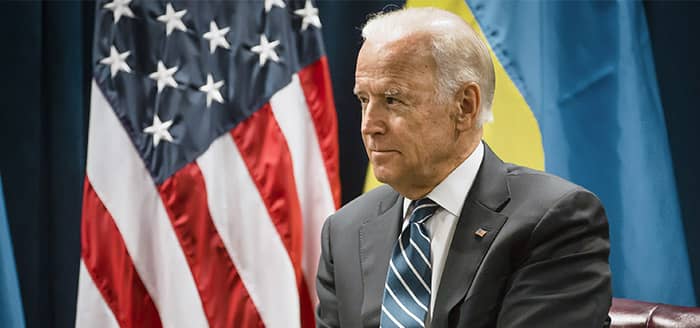The Cancer Moonshot Initiative and What It Means for Mesothelioma


Vice President of The United States, Joe Biden
In January, President Obama addressed the nation in his final State of the Union speech. During that address, he called on Vice President Joe Biden to head a new and unprecedented initiative in the fight against cancer. He believes that America can be “the country that cures cancer once and for all,” and he’s launching a new initiative to help us get there. The initiative is called the National Cancer Moonshot, and it’s going to push cancer research further than ever before.
Getting to the moon seemed as good as impossible in the 1960s, but when President Kennedy said America needed to get there within the decade, the country pulled together to make it happen. The years after Kennedy’s speech brought a wave of massive government investment in technology via a new space program. Those advances, along with collaborations between science and engineering experts across private industries, government, and military, resulted in that small step for Neil Armstrong, and a giant leap for mankind.
The Time to Cure Cancer Is Now
It’s time for cancer research to take that leap. After decades of scientific effort and billions of dollars in research, defeating cancer can sometimes feel as distant to us as the moon. Despite a determined “war on cancer,” the numbers are still discouraging: Up to half of all American men and one-third of all American women will receive a cancer diagnosis in their lifetimes. But President Obama hopes that what worked for the moon will work for cancer – one billion dollars in focused investment in an unprecedented era of scientific and social collaboration.
The National Cancer Moonshot pulls together the heads of a dozen different government agencies and departments, including the Departments of Defense, Commerce, Energy, and Veteran’s Affairs. The Task Force includes the heads of the Food and Drug Administration (FDA), National Institutes of Health (NIH), National Science Foundation (NSF), and National Cancer Institute (NCI). Their mission is to accelerate understanding of cancer by supporting access to new research and removing excessive regulatory barriers to important breakthroughs. They will focus on improving patient care by encouraging development of new cancer treatments and developing essential new partnerships between public and private research teams.
Partnerships, even crowdsourcing, are one of the biggest ways that this Cancer Moonshot Initiative can change the face of research. Vice President Biden spoke to open health data innovators and advocates at the Health Datapalooza in Washington DC this week, asking them to use their talents and expertise to fight cancer. “There’s a load and an enormous amount of data out there,” he told them, “but not readily available. Imagine what you could do to help in the fight against cancer if you had access to the millions of cancer pathologies, genomic sequences, family histories and treatment outcomes.” Knowledge is power – so why not share it?
The National Cancer Moonshot is already encouraging research entities to work harder towards innovation and collaboration among researchers. The National Cancer Institute has put out a call for suggestions and ideas from the research community and the public. An online platform will collect submissions and a Blue Ribbon Panel of patient advocates and scientific experts will select the best among them for further funding and support. They’re hoping that opening up the discussion to everyone will lead to new approaches to clinical trials and data sharing, and improvements to new treatments like immunotherapies.
Immunotherapy is such a promising field of research that Johns Hopkins, inspired by the National Cancer Moonshot, has just opened a brand new center dedicated to it. The launch of the Bloomberg–Kimmel Institute for Cancer Immunotherapy was announced this spring and will be completely devoted to “focused and collaborative” research into immunotherapy targets. Most of the Institute’s funding will be funneled into direct research, but some is also marked for recruiting new scientists, developing new technologies, and fostering partnerships with the private pharma and biotech sectors to get new drugs into manufacturing more efficiently.
How the Cancer Moonshot Will Help Mesothelioma Patients
While the goal is to prevent, treat, and cure all cancers, a focus on immunotherapy is especially good news for mesothelioma patients. Many of the newest and most promising treatments for mesothelioma are based on immune targeting. Antibody therapies like Keytruda and Opdivo are already helping to extend the lives of people who are fighting mesothelioma, and the funding and support behind the Moonshot could help to push new drugs down the pipeline faster and get them into mesothelioma clinical trials where they can start to make a difference.
In fact, one of the medical centers Mr. Biden visited after the Moonshot was announced was Penn’s Abramson Cancer Center in Philadelphia. That Cancer Center is home to the nationally-recognized Mesothelioma and Pleural Program, which hosts a medical team with extensive mesothelioma expertise. Mr. Biden visited the team to collect their input for the Moonshot Task Force, asking them to educate him on what needs to happen so that they can get the job done.
The Moonshot Is About Collaboration
Curing cancer is a remarkably ambitious goal. Every cancer is just a little bit different, and the demands on the scientific community are huge. But everyone involved knows just how important it is to get the job done. The national discussion around the Moonshot Initiative is putting media focus on cancer again and inspiring philanthropists to put their money to good use in cancer research.
You can stay informed about the Moonshot’s progress by checking in with cancer.gov or following official posts on the initiative’s Medium page. If you’re involved in cancer research, or even if you’re a cancer patient, or a family member of a cancer patient, you can speak up and let the National Cancer Institute – and your legislators – know what you think and make suggestions.
It’s going to take a big team to beat cancer for good, so you may as well be a part of it.